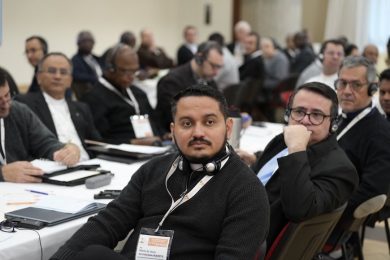MELBOURNE, Australia (CNS) — An Australian appeals court upheld the conviction of Cardinal George Pell on five counts of sexually assaulting two choirboys more than two decades ago.
A three-judge panel of the Appeals Division of the Supreme Court of Victoria announced its decision Aug. 21 in Melbourne.
Chief Justice Anne Ferguson read the decision during a 30-minute hearing. She said the court was split 2-1 on the cardinal’s argument that the conviction was “unreasonable” given the evidence presented at trial to convict him beyond a reasonable doubt.
“Justice (Chris) Maxwell and I accepted the prosecutor’s submission that the complainant was a compelling witness, was clearly not a liar, was not a fantasist and was a witness of truth,” Ferguson said.
Justice Mark Weinberg agreed with Pell’s attorneys.

The chief justice also told the court that the three judges unanimously agreed to through the two other grounds for appeal: that the cardinal should have presented his not guilty plea in person to the trial jury in December rather than by video and that the cardinal’s lawyers were not permitted to play a 19-minute animation to the jury in their closing statement.
Ferguson said the court decided that Cardinal Pell must continue to serve at least three years and six months of the six-and-a-half-year sentence he received following his conviction in December.
“Whether he will be released on parole will be a decision of the adult parole board, not the court,” she said.
Cardinal Pell, the most senior church official to be convicted of sexual abuse, can appeal the decision to the High Court of Australia.
With the conviction upheld, Cardinal Pell could be stripped of his priesthood and may also be expelled from the College of Cardinals
The decision from the three-judge panel followed a two-day hearing June 5-6 in which Cardinal Pell, 78, and his attorneys argued that his December 2018 conviction on five counts of sexually assaulting two choirboys was “unreasonable” given the evidence presented.
The conviction occurred during the second trial for Cardinal Pell. The first trial in September 2018 resulted in a hung jury.
The guilty verdict regarded one count of “sexual penetration,” in this case oral sex, and four counts of indecent acts with or in the presence of a minor under 16 years of age.
The incidents were alleged to have occurred in the sacristy of St. Patrick’s Cathedral in Melbourne in 1996 when the cardinal was an archbishop.
Following the conviction, the former key adviser to Pope Francis was sentenced to six and a half years in prison. He began serving the sentence in March and is being held in solitary confinement in Melbourne Assessment Prison because of the nature of the offenses and his high profile in Australia.
The Vatican continues to conduct its own investigation of the cardinal.
Under Melbourne Archbishop Peter Comensoli, the cardinal’s successor, the archdiocese has begun implementing the Australian Catholic Church’s new safeguarding standards in response to a report by the Royal Commission into Institutional Child Sexual Abuse.
Pell’s attorney, Bret Walker, argued during the appeals hearing that there were 13 reasons why it was improbable that Cardinal Pell had assaulted the boys after presiding over Sunday Mass in the cathedral; a few weeks later he assaulted one of the boys a second time, according to court testimony.
On the second day, prosecuting attorney Christopher Boyce appeared to struggle with questions from three justices presiding over the hearing. But in its written submission the prosecution said: “When looking at the whole of the evidence, the integrity of the jury’s verdicts is unimpeachable.
“The jury were entitled to accept the complainant as a reliable and credible witness,” the submission stated. “He was skillfully cross-examined for two days by a very experienced member of senior counsel. The complainant’s allegations were not improbable when all of the evidence is carefully considered.”
At the appeals hearing, the prosecution also maintained that the surviving victim’s testimony was credible and that the decision of the jury should be respected.






















